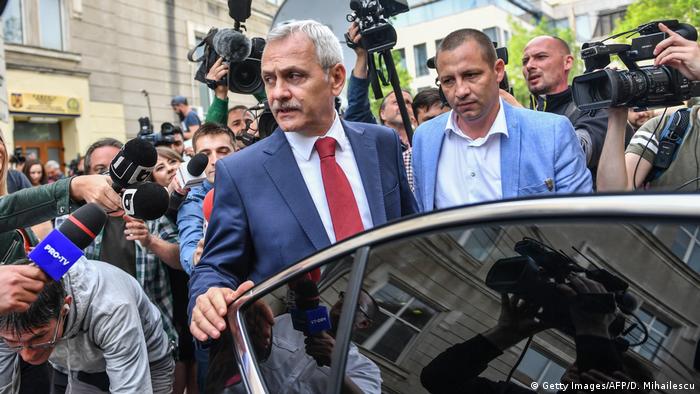Just before Romania takes over the presidency of the EU, makes the country an anti-centralist Initiative for excitement. It is also about the better use of EU funds. The government gets a whiff of separatism.

Hardly the County Councils of the two Northern Romanian counties of Maramures and Sathmar had announced that they of the Carpathian Euroregion were to join, broke out in the nationalist press a storm of indignation. Although it was simply an economic cooperation between border regions in Poland, Slovakia, Hungary, Ukraine and Romania. However, in Bucharest raged commentators: The accession of the two circles to the Euroregion is separatism. Shortly thereafter, the government stepped in: they ban the two counties, the Euroregion. Rationale: membership in the body of undermining the territorial unity of the country and a threat to national security.
The current political issue has a long history. The one that occurred in the spring of 1993, shortly after the establishment of the Carpathian Euroregion, and a parade example of the excesses of the Ultra-centralism in the post-Communist Romania. But now, a quarter of a century later, makes a similar case for riots in the Romanian Public just a few days before Romania takes for the first time, the presidency of the EU.
“Alliance of the West” is looking for business prospects
At the beginning of December, the mayors of the four most important Transylvanian towns – Arad, Oradea (Oradea), kolozsvár (Cluj) and Timisoara (Timisoara) – founded a Kooperationsbündis under the name “Alliance of the West”. The Alliance is not to be understood as a political Initiative, but seeks better economic cooperation on a regional level. The four cities want to joint infrastructure and economic projects and, above all, the use of EU funds improve.
The storm was not long in coming: The nationalist TV station “Antena 3” sensed “a maneuver for the break-up of Romania”, the tabloid “Evenimentul zilei” was the headline: “Will detach Transylvania?” Politicians of the nominally social-democratic ruling party, the PSD, referred to the Initiative as a threat to the integrity of Romania. The four mayors were forced to denials. “We have no separatist project”, said the mayor of Oradea, Ilie Bolojan.

Bucharest has everything under control: Liviu Dragnea, Chairman of the ruling social Democrats and President of the chamber of deputies.
In an interview with Deutsche Welle, the mayor of Arad, Gheorghe Falca, rejected the charge of separatism decided. “It just goes to a regional economic cooperation”, Falca. “We have a constitutional right.” The well-known Transylvanian-Hungarian politician and lawyer Péter Eckstein-Kovács, the separatism-discussion compared to the DW referred to as nonsense: “No sensible person can take such allegations seriously.”
Local autonomy versus nationalism
The topics of regionalism, decentralisation or local autonomy in Romania, until today, to some seemingly absurd nationalist reactions. A General Problem lies behind the Initiative of the four mayors: In Romania, a rigid fiscal and Financial reigns centralism, which is a source of political patronage, bureaucracy and corruption. “Many funds will only be awarded to the respective clientele of the ruling party,” says political analyst Cristian Pirvulescu, compared to the DW. “Where the Opposition ruled, little or nothing.”
The four cities of the “Alliance of the West” to be ruled by the liberal opposition party, the PNL, all four mayors. “We have to get for the past three years for greater investment and more money from Bucharest,” complains Gheorghe Falca. Now the Alliance wants to apply for joint projects with EU funds, among other things, for the Expansion of highways and feeder roads, for public transport and for the construction of hospitals.
However, the Initiative also has a hidden political component: it was Published the founding statement of the Alliance a few days after the celebration of the century of the “Great unification”, i.e. the connection of Transylvania in 1918, at the former Romanian Kingdom. The former “Declaration of Alba Iulia”, the Romanian representatives of the people to the Union with Romania, it is disputed until today, but it offers room for interpretation about a possible state within the character of a United Romania and rights of autonomy for its minorities. The four mayors are committed to the Romanian state and write at the same time: “The Declaration of Alba Iulia proposes to future generations, the project of centralism and bureaucracy in the liberated country. Because of rigid centralism and bureaucracy, the caste of the politicians and officials, not citizens.”

Not a cliché: agriculture today, in the Transylvanian Probst village
It is a game for the strong regional pride of the Transylvanian Romanians and their common separation from the “Kingdom”, so the historically less developed parts of the country to the South and East. Behind this choice of battle tactics is on the one hand, in 2020, to be elected in Romania, both new local governments, as well as a new Parliament. The voters in Transylvania, the main base are votes for the liberal Opposition.
On the other hand, establish the four mayors on unspoken of earlier anti-centralist Manifests. The most famous appeared in the autumn of 1998 and was entitled “I have Romania tired”, written by Klaus Burger journalist Sabin Gherman, who wrote: “Europe and Transylvania in the Carpathian mountains. Except for the language and the bad roads we have nothing in common. I have Romania tired and want my Transylvania.” The Manifesto made at that time for the week long excitement, a high-treason trial against Sabin Gherman was considered.
With such the four Transylvanian mayor does not have to reckon today. More Of the mayors colleagues, they received big applause, similar initiatives will also be established in other parts of the country. Whether this will result in a successful uprising against the centralism is, dares not predict the political scientist Cristian Pirvulescu. In one thing he is certain: “The concept of centralism has failed in Romania.”